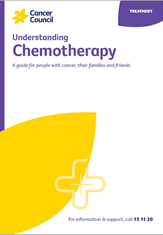- Home
- Cancer Information
- Cancer treatment
- Chemotherapy
- Having chemotherapy
- Other ways of having chemotherapy
Other ways of having chemotherapy
There are other ways of having chemotherapy, depending on the drugs being used and the type of cancer you have. You may have oral chemotherapy, injections into various parts of the body or creams you apply to the skin.
Learn more about:
Oral chemotherapy
Some people are able to take chemotherapy as tablets or capsules at home. Your doctor, nurse or pharmacist will tell you how and when to take them, and how to handle the drugs safely.
Injections
Less commonly, chemotherapy can be injected using a needle into different parts of the body:
- into a muscle, usually in your buttock or thigh (intramuscular)
- just under the skin (subcutaneous)
- into the fluid around the spine (intrathecal, also known as a lumbar puncture)
- into an artery (intra-arterial)
- into your abdominal area (intraperitoneal)
- into the outer lining of the lungs (intrapleural)
- into the bladder (intravesical)
- into the tumour (intralesional; this method is rare).
Cream
Some skin cancers are treated using a chemotherapy cream applied directly to the skin. This is called topical chemotherapy. For more on this, see Topical treatments for skin cancer.
Transarterial chemoembolisation (TACE)
Used for primary liver cancer or some types of cancer that have spread to the liver, TACE involves injecting high doses of chemotherapy directly into the liver tumours. The chemotherapy will either be mixed with an oily substance or loaded onto tiny plastic beads. The blood vessels feeding the tumour may also be blocked (embolisation).
Podcast: Making Treatment Decisions
Listen to more episodes from our podcast for people affected by cancer
More resources
Prof Timothy Price, Medical Oncologist, The Queen Elizabeth Hospital, SA; Graham Borgas, Consumer: Dr Joanna Dewar, Medical Oncologist and Clinical Professor, Sir Charles Gairdner Hospital and The University of Western Australia, WA; Justin Hargreaves, Medical Oncology Nurse Practitioner, Bendigo Health Cancer Centre, VIC; Angela Kritikos, Senior Oncology Dietitian, Dietetic Department, Liverpool Hospital, NSW; Dr Kate Mahon, Director of Medical Oncology, Chris O’Brien Lifehouse, NSW; Georgie Pearson, Consumer; Chris Rivett, 13 11 20 Consultant, Cancer Council SA; Marissa Ryan, Acting Consultant Pharmacist (Cancer Services), Pharmacy Department, Princess Alexandra Hospital, QLD.
View the Cancer Council NSW editorial policy.
View all publications or call 13 11 20 for free printed copies.
Need to talk?
Support services
Work and cancer
Information for employees, employers and workplaces dealing with cancer
Looking for transport, accommodation or home help?
Practical advice and support during and after treatment
Cancer information
Radiation therapy
Information about this common cancer treatment, which is sometimes used with chemotherapy or on its own
Making cancer treatment decisions
Decision-making steps, consent and second opinions

